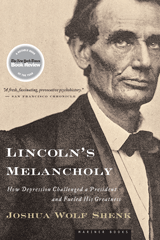 I swiped a book off Mr. Chattering’s bedside table, not expecting it to be one of the best books I’ve ever read. I just wanted a good post for Abe Lincoln’s birthday this Monday. “Lincoln’s Melancholy: How Depression Challenged a President and Fueled His Greatness” by Joshua Wolf Shenk has received all kinds of prizes, even earned its own TV special. But if you haven’t actually read the whole volume, please dash out and locate a copy–especially if you’re wanting to “change the world,” or if “consciousness” and staying present to whatever life slings you is an ambition of yours.
I swiped a book off Mr. Chattering’s bedside table, not expecting it to be one of the best books I’ve ever read. I just wanted a good post for Abe Lincoln’s birthday this Monday. “Lincoln’s Melancholy: How Depression Challenged a President and Fueled His Greatness” by Joshua Wolf Shenk has received all kinds of prizes, even earned its own TV special. But if you haven’t actually read the whole volume, please dash out and locate a copy–especially if you’re wanting to “change the world,” or if “consciousness” and staying present to whatever life slings you is an ambition of yours.
As you probably know, Abraham Lincoln suffered from depression, and experienced two major depressive episodes as a younger man. “No element of Mr. Lincoln’s character,” wrote his colleague Henry Whitney, “was so marked, obvious and ingrained as his mysterious and profound melancholy.” Said Lincoln’s law partner William Herndon: “His melancholy dripped from him as he walked.”
But what Shenk does so brilliantly is show how Lincoln’s depressive personality endowed him with the depth (born out of torment) to rise up and be great. Shenk writes:
…the depths of emotion that he explored as a result of his depression contributed to a deep creative capacity — as a writer and thinker. In his first inaugural address, he urged that the country would be well again when touched by “the better angels of our nature.” He didn’t say that that the worse angels would be killed or that they would go away. To the contrary, the image suggests that selves, and nations, are multi-faceted, capable of better and prone to worse, and locked in a struggle. It’s justifiably a famous phrase, and it reaches deep into the psyche because it reflects an experience that every human being knows intuitively, one of division and conflict, broken-ness and harmony, suffering and reward. These were ideas that Lincoln lived and struggled with much of his life.
It is wonderful to contemplate how a man charged with holding our whole nation together learned from his own struggle with a split within himself. Another thing I gathered from Shenk is that Lincoln, who was never a consistent church-goer, was a most gifted religious thinker on the subject of suffering. Shenk discusses this point here in an excellent article he wrote for Beliefnet:
“…unlike some fatalists, who renounced any claim to a moral order, Lincoln saw how man’s reason could discern purpose even in the movement of a vast machine that grinds and cuts and mashes all who interfere with it. Just as a child learns to pull his hand from a fire when it is hot, people can learn when they are doing something that is not in accord with the wider, unseen order. To Lincoln, Herndon explained, ‘suffering was medicinal & educational.’ In other words, it could be an agent of growth.”
Since we are currently a nation at war, I think you’ll find Shenk’s book and article quite timely and perhaps helpful in a personal way. We are not the first generation of Americans to ponder our meaning, our worth, our contributions in trying times. What a luminous soul. What an inspiring man. Did you know that on the morning of his assassination, he told his associates that he’d had a dream that he was traveling to a distant place? Shenk’s writings will bring Lincoln back to you so alive, you’ll feel as though he’s sitting beside you.

